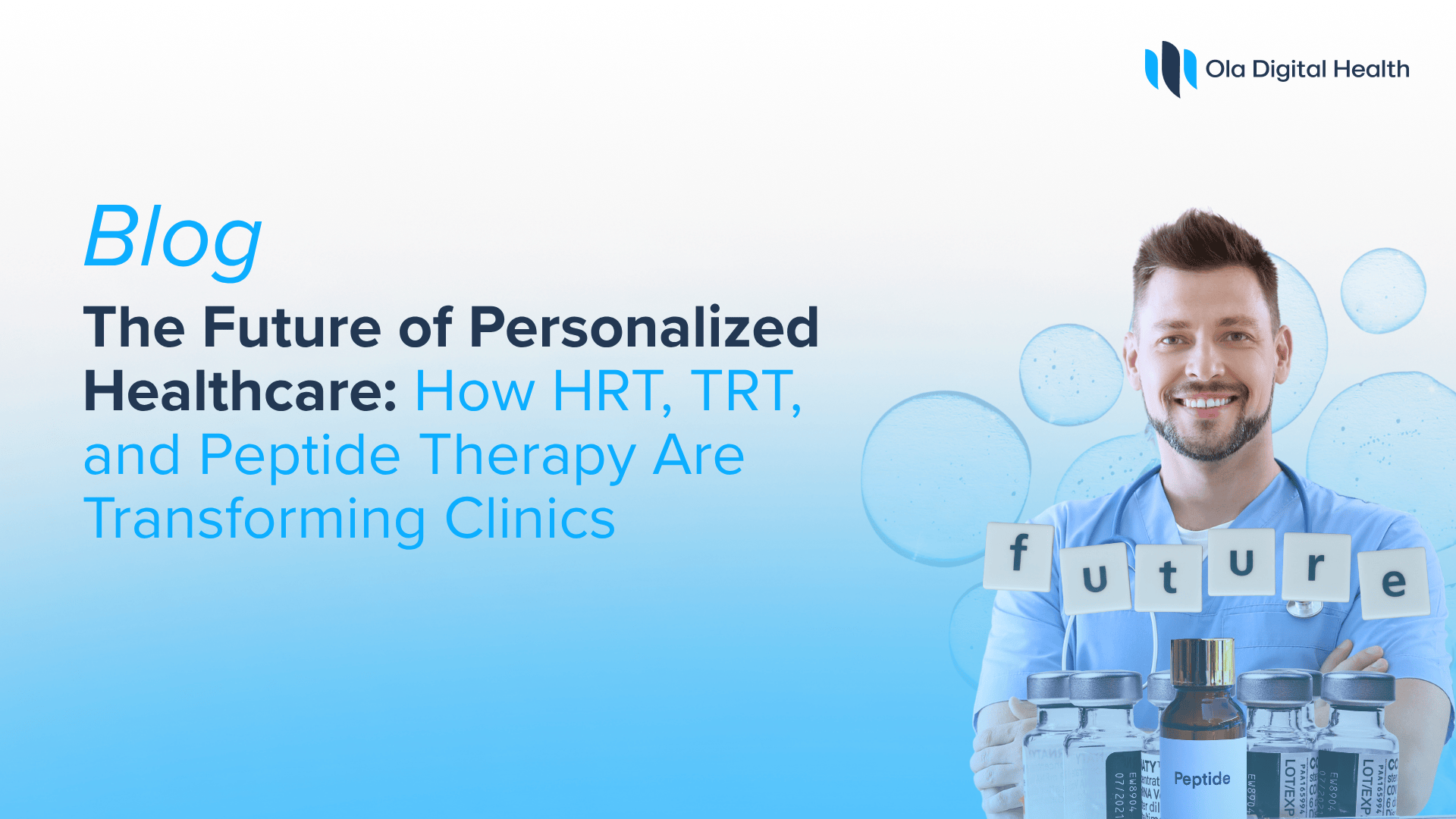Think about the last time you went to a clinic. The experience probably followed a predictable pattern: you filled out forms, saw a doctor, got a standard prescription, and were sent on your way. For decades, healthcare has mostly been about “one-size-fits-all.” But now, something big is changing. Clinics around the world are beginning to adopt precision medicine. And when it comes to hormones, longevity, and overall well-being, this shift is nothing short of revolutionary.
Precision medicine HRT clinics are leading the way in showing how deeply personal healthcare can become. Instead of assuming every patient needs the same hormone dose, these clinics are rewriting the playbook with personalized medicine hormone therapy, carefully tailoring treatments like HRT, TRT, and peptide therapy to the individual. The result? People not only feel better, but they often report they are living healthier, fuller lives.
This blog will explore how clinics are embracing HRT, TRT, and peptides, why it matters, and what it could mean for the future of healthcare.
Precision Medicine and Longevity Clinics
The rise of longevity clinics signals a new era. These clinics do not just treat symptoms. They look at how to keep people healthier for longer. The focus is not only on disease prevention but also on quality of life.
Take hormone replacement therapy personalized protocols as an example. Instead of giving a standard dose of estrogen or testosterone, doctors in these precision-driven clinics run advanced diagnostics. They look at blood work, genetics, and lifestyle factors. Then they design a therapy that is unique to the patient.
The same goes for TRT clinics USA, which have seen a surge in popularity. Men dealing with low energy, muscle loss, or mood swings are not just being prescribed “one pill for everyone.” Instead, these clinics focus on how testosterone replacement interacts with each individual’s biology. This is the heart of next-gen personalized healthcare with HRT.
And then there are peptides. If you have not heard of them yet, you soon will. Peptide therapy in longevity clinics is being used to help with fat loss, muscle recovery, anti-aging, and even sleep regulation. In other words, peptides are quietly becoming the missing link between traditional medicine and the growing demand for wellness-focused care.
Why Clinics Are Combining HRT, TRT, and Peptide Therapy
Imagine trying to fix your car by adjusting only one part of the engine without looking at how the whole system works. That is what traditional hormone therapy often did. But today, clinics offering peptide and hormone therapy are creating combined protocols that address multiple areas of health at once.
For example, how clinics use peptides and TRT is fascinating. A patient might come in with low testosterone, which affects muscle mass and mood. The clinic prescribes TRT, but they also introduce a peptide that boosts recovery and supports fat metabolism. The result is not only higher testosterone but also better sleep, faster muscle repair, and more energy.
This holistic combination is exactly why precision medicine HRT clinics are growing. They recognize that no two patients are alike. A 45-year-old man with low testosterone may also need peptides for recovery from workouts. A 50-year-old woman in menopause may require HRT plus peptides for bone density and skin health.
The future of healthcare is not about single fixes. It is about stacking the right therapies together to create the best outcomes.
The Role of Personalization in Hormone Therapy
Let’s get personal.
For years, personalized medicine hormone therapy was more of a buzzword than a reality. Doctors would still rely on general protocols, even when they claimed it was “personalized.” But things are changing.
With today’s diagnostic tools, clinics can track hormone levels, genetic variations, and lifestyle markers in detail. That means a patient no longer receives “average” testosterone replacement. Instead, the dose and method are matched to their body’s rhythms and needs.
Similarly, hormone replacement therapy personalized protocols are not just about estrogen patches or testosterone shots. They can include bioidentical hormones, peptides for metabolism, and lifestyle coaching. This layered approach ensures that patients do not just see changes in lab reports—they feel the difference in their daily lives.
And let’s be honest, when patients see real results, they stick with their treatments. That is exactly why clinics are investing in precision medicine now.
How Peptides Are Reshaping Longevity Care
Here is the exciting part. Peptides are not science fiction anymore. They are small chains of amino acids that signal the body to perform specific functions. Think of them as “biological text messages” telling your system what to do.
In peptide therapy in longevity clinics, doctors are using these compounds for everything from fat loss to immune support. A popular peptide might help increase growth hormone naturally, which leads to better recovery, more lean muscle, and improved sleep. Another peptide could help regulate appetite, making weight management more sustainable.
When combined with TRT clinics USA or HRT clinics, peptides make the treatment plans more dynamic. Instead of just balancing hormones, clinics are helping patients enhance performance, slow aging, and recover faster. This is the “longevity” part of longevity clinics in action.
It is no surprise then that clinics offering peptide and hormone therapy are gaining popularity. Patients today want more than just to feel “okay.” They want energy, clarity, and the ability to stay active for decades longer. Peptides make that goal far more achievable.
Why HRT Clinics Should Offer Peptides and Other Therapies
Now comes the big question. Why should every precision medicine HRT clinic or TRT clinic in the USA consider offering peptides?
The answer is simple: because patients are asking for it.
Healthcare is becoming consumer-driven. Patients research online, read about new therapies, and arrive at clinics with high expectations. If a clinic is still offering only traditional HRT, it risks being left behind. Patients will look for a place that gives them the full range of options.
Adding peptides to a clinic’s offerings is not just about business growth—it is about better patient outcomes. A menopausal patient may not feel her best with estrogen therapy alone. Adding the right peptide can address her energy levels and sleep quality. A male patient on TRT might see better body composition results when paired with peptides that target fat metabolism.
This is the future of next-gen personalized healthcare with HRT. It is not about sticking to one formula. It is about creating flexible, patient-centered programs that evolve with science.
According to the National Institutes of Health, personalized medicine and peptide-based therapies are gaining significant momentum, with early studies showing promising results for long-term wellness (NIH report).
Clinics that embrace this model are not just keeping up with the times—they are setting the standard.
What Patients Really Want from Clinics
At the end of the day, patients want to feel seen. They want to walk into a clinic and know that their treatment will be designed for them, not the average person.
That is the power of personalized medicine hormone therapy and clinics offering peptide and hormone therapy. It gives people confidence that they are getting the most advanced, science-backed care tailored to their lives.
And once patients experience this, they rarely go back to traditional medicine. That is why precision medicine HRT clinics and TRT clinics USA are not just a trend. They represent a permanent shift in how healthcare is delivered.
The Future Belongs to Personalized and Precision Care
Looking ahead, one thing is clear. The clinics that thrive will be the ones that embrace personalization fully. That means building hormone replacement therapy personalized protocols, adopting peptides, and offering flexible therapy stacks that respond to patient needs.
It also means investing in education, both for patients and providers. Many people still do not know what peptides are or how they can work alongside TRT or HRT. Clinics that take the time to explain and guide patients will be the ones that build trust.
The future is not about prescribing the same dose to everyone. It is about a next-gen personalized healthcare with HRT model, where every detail matters.
Final Thoughts
Healthcare is changing before our eyes. What used to be experimental—like peptides or highly specific hormone protocols—is now becoming mainstream. Patients are seeking out precision medicine HRT clinics, TRT clinics in the USA, and longevity clinics offering peptide therapy because they want better outcomes and more control over their health.
And the smart clinics are listening. By adopting personalized medicine hormone therapy and embracing the power of peptides, they are not just staying relevant. They are leading the charge into the future of medicine.
This is what clinics offering peptide and hormone therapy are proving every day: that healthcare works best when it is personal, precise, and designed for the long run.
The clinics that understand this are not only helping patients live longer, healthier lives—they are shaping the future of medicine itself with the right support from platforms like Ola Digital Health.
Schedule a call with our expert today or Get in touch.








